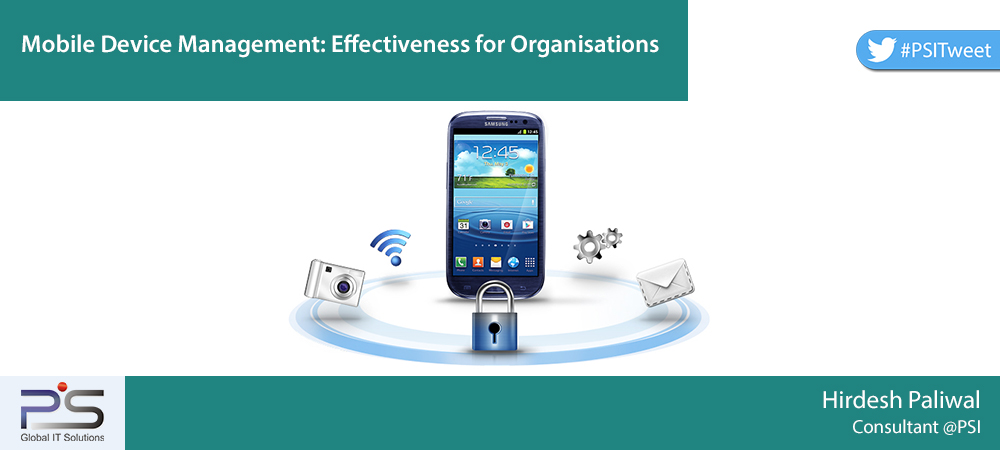
Mobile device management (MDM) refers to the administration of mobile devices like smartphones, tablets, laptops and desktop computers. MDM is usually implemented by using third party application with in built features to manage mobile devices. It is being increasingly used as the number of mobile devices per knowledge worker has risen to 3.3 devices.
MDM is varied platform that simplifies the management of mobile devices without compromising the user experience, security and privacy. MDM solutions include policy enforcement, configuration management, security establishment and enforcement, integrity maintenance, encryption in case of theft/loss of device, changes in application settings, monitoring the device usage, process updates and modifications. MDM products are typically composed of a client application on the mobile device, server instances that IT administers and an intermediary server the MDM vendor runs.The main purposes of MDM include:
1. Enable mobile devices to enroll and use the corporate infrastructure with ease.
2. Encourage more productivity by enabling employees to work anytime and anywhere.
3. Securely manage data on mobile devices.
4. Over-the-air (OTA) distribution of data, configuration settings and applications for all types of mobile devices used in the organization.
With MDM solution you can ensure easy availability of business information and data access for employees without invading their privacy and allowing them to use personal devices.
Implementing MDM in the organisation helps in:
1. Remote support for both company and employee owned (BYOD) devices. Support and updates are done over the air.
2. Ability to remotely encrypt the device and data in case of theft /loss. The MDM platform enables security teams to remove confidential information from lost devices, regardless of location.
3. Control the usage of applications on the devices. Remote monitoring of mobile devices ensures that corporate security is not jeopardized by unauthorized apps.
4. Maintain detailed records of users and device statistics. Employee usage statistics is beneficial in reviewing performance and productivity of employees.
5. Ability to automatically push software updates to device. Devices can also be updated automatically and uniformly without impeding on employee’s time.
6. Ensure employee devices are password protected. MDM enables remote management of passwords for security teams to ensure that information is protected always.
7. Reduces support costs and business risks by controlling and protecting the data and configuration settings.
8. Deploy required enterprise applications and allow recommended applications to be downloaded via an enterprise app store.
9. Allow secure access to business data by instantly connecting users over corporate Wi-Fi and VPN profiles.
10. Enforce device passwords settings, Block non-compliant devices from accessing corporate resources.
However it is important for businesses to realize that not all MDM solutions are identical and offer all features. Every solution has its set of positive features and few loopholes, so businesses need to carefully assess the suitability of the MDM solution.
The market is flooded with variety of MDM tools of big giants like Microsoft, Dell and BlackBerry and other independent vendors like MobileIron and AirWatch.
With enterprise mobility coming to the forefront, MDM solutions are gaining valuable place in organizations who seek to better control their overall IT costs, productivity and security.
Image Courtesy: samsung.comMobile device management (MDM) refers to the administration of mobile devices like smartphones, tablets, laptops and desktop computers. MDM is usually implemented by using third party application with in built features to manage mobile devices. It is being increasingly used as the number of mobile devices per knowledge worker has risen to 3.3 devices.
MDM is varied platform that simplifies the management of mobile devices without compromising the user experience, security and privacy. MDM solutions include policy enforcement, configuration management, security establishment and enforcement, integrity maintenance, encryption in case of theft/loss of device, changes in application settings, monitoring the device usage, process updates and modifications. MDM products are typically composed of a client application on the mobile device, server instances that IT administers and an intermediary server the MDM vendor runs.
The main purposes of MDM include:
1. Enable mobile devices to enroll and use the corporate infrastructure with ease.
2. Encourage more productivity by enabling employees to work anytime and anywhere.
3. Securely manage data on mobile devices.
4. Over-the-air (OTA) distribution of data, configuration settings and applications for all types of mobile devices used in the organization.
With MDM solution you can ensure easy availability of business information and data access for employees without invading their privacy and allowing them to use personal devices.
Implementing MDM in the organisation helps in:
1. Remote support for both company and employee owned (BYOD) devices. Support and updates are done over the air.
2. Ability to remotely encrypt the device and data in case of theft /loss. The MDM platform enables security teams to remove confidential information from lost devices, regardless of location.
3. Control the usage of applications on the devices. Remote monitoring of mobile devices ensures that corporate security is not jeopardized by unauthorized apps.
4. Maintain detailed records of users and device statistics. Employee usage statistics is beneficial in reviewing performance and productivity of employees.
5. Ability to automatically push software updates to device. Devices can also be updated automatically and uniformly without impeding on employee’s time.
6. Ensure employee devices are password protected. MDM enables remote management of passwords for security teams to ensure that information is protected always.
7. Reduces support costs and business risks by controlling and protecting the data and configuration settings.
8. Deploy required enterprise applications and allow recommended applications to be downloaded via an enterprise app store.
9. Allow secure access to business data by instantly connecting users over corporate Wi-Fi and VPN profiles.
10. Enforce device passwords settings, Block non-compliant devices from accessing corporate resources.
However it is important for businesses to realize that not all MDM solutions are identical and offer all features. Every solution has its set of positive features and few loopholes, so businesses need to carefully assess the suitability of the MDM solution.
The market is flooded with variety of MDM tools of big giants like Microsoft, Dell and BlackBerry and other independent vendors like MobileIron and AirWatch.
With enterprise mobility coming to the forefront, MDM solutions are gaining valuable place in organizations who seek to better control their overall IT costs, productivity and security.
Image Courtesy: samsung.com[:]








